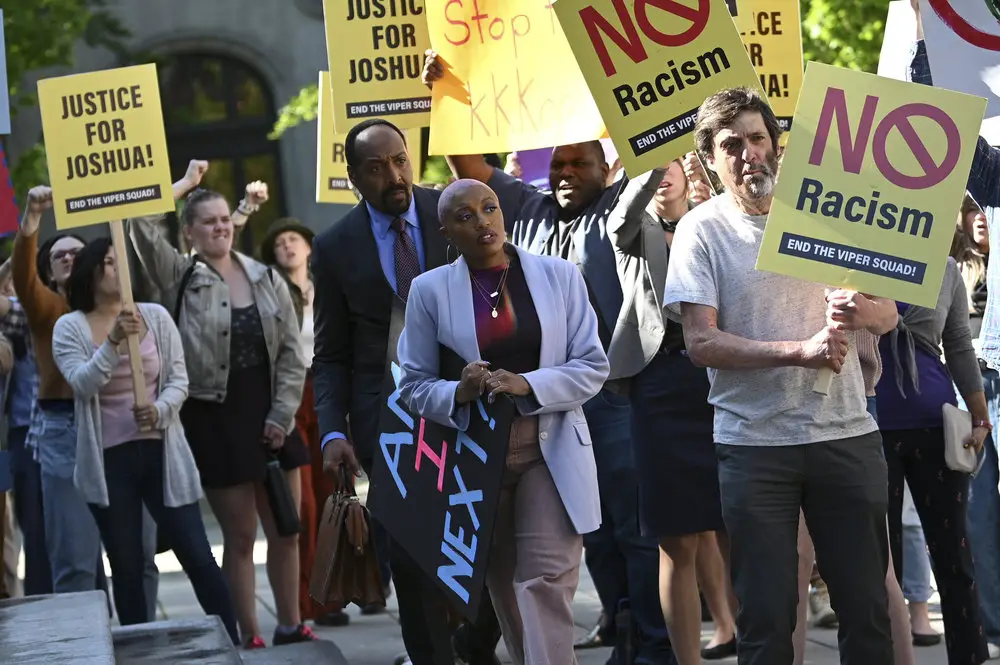Things aren’t entirely as they seem in The Irrational 1×06 “Point and Shoot.” The episode at first appears to be about the abuse of power, police violence against the Black community, and the ways the authorization of violence leads to the normalization of it. In the end, it’s about all of those things, as well as political corruption and old-fashioned greed.
Let’s get straight to it.
The Plot Thickens

There’s a lot to say about this week’s episode, so let’s get the season’s overarching plot out of the way, first. We knew when the F.B.I.’s only real suspect for the church bombing died in the last episode that this wouldn’t be the end of the story. And, indeed, it is not. Alec Mercer (Jesse L. Martin) isn’t about to let this go. Neither is Agent (and his ex-wife) Marisa (Maahra Hill). Or her partner/inexplicable boyfriend (I have yet to see what she sees in him) Jace (Brian King).
But Alec’s got quite a bit on his plate right now, so that’s going to have to be an issue for another day.
Mercer v. Atwood

“Point and Shoot” introduces, if not a nemesis for behavioral scientist Alec Mercer , then the closest we may get to an equal. Dustin Atwood (Malcolm-Jamal Warner) is something of a behavioral scientist himself, as a professional witness for the defense when the defendants are the police. He’s good at reading the jury and getting police offers charged with excessive violence acquitted.
If there’s anyone who can read a jury and get through to them as well as Atwood, it’s Mercer. So he takes the case (in which officers entered the wrong address with a no-knock warrant and killed one of the innocent homeowners inside) at no charge. And, when the jury seems swayed in favor of the defense, he realizes that “the system is broken” is too big of a message for them to want to accept. People want to believe “one bad apple spoils the bunch,” not that the whole barrel is rotten. So, instead, he suggests on the stand that the jury can get rid of some bad apples. Sparing the rest of the barrel.
In the end, who’s the better behavioral analyst? Well, Mercer rightly concludes that Atwood will do the right thing. For the right or the wrong reasons. So for my money, he wins this one.
Hidden Motives

Mercer’s approach presents a very pragmatic way to address a complicated problem. There’s no question that these issues are too big for most people to want to tackle. It’s easier for people to fix a problem if they think there’s a simple solution. If the problem is the entire system, they’re more likely to balk. Or give up. Or even embrace willful ignorance.
But, as it turns out, Alec’s case isn’t as simple as it appears. Which he begins to realize in his quest to find that “simple solution” that people are more willing to accept. This isn’t a case of a police strike force entering the wrong person’s house and murdering the homeowner by accident. Rather, the strike force was used as something of a hit squad by a corrupt judge, who was trying to silence the homeowner in question before his crimes could be exposed.
All things considered, Judge Haynes’s (Michael Querin) diabolical plan was full of some pretty big holes. And may serve as a greater indictment of the police system than anything else in the episode. It depended upon a clerk not doing better due diligence, once the system was up and running again. On officers being ready – if not eager – to shoot upon forcing their way into the residence. And on them shooting the judge’s target, and not anyone else in the household. Such as the victim’s husband, Mason (Emidio Lopes).
The judge used the police as a hit squad. And they in fact murdered the innocent man he was targeting. That they acted with the level of violence, lack of restraint, and foregoing any de-escalation strategies first that were required for his plan to be a success is a damning indictment indeed.
Making the final resolution in The Irrational 1×06 “Point and Shoot” – one judge going to jail, and one strike force disbanded – seem very little like justice has been served, after all.


